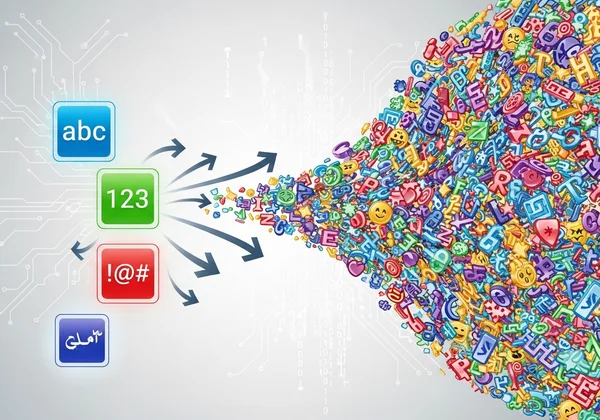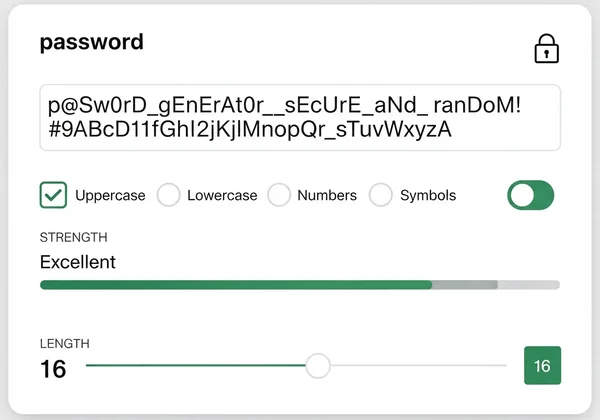Understanding Password Entropy: Create Strong Passwords with an Online Password Generator
Are you confident your online accounts are secure? For years, we've been told that a long password with a mix of symbols and numbers is the key to safety. While that's a good starting point, it only scratches the surface. There's a deeper, more scientific measure of password robustness that separates a truly strong password from a merely complex one. This measure is password entropy—the definitive answer to what makes a password truly robust against modern cyber threats.
The digital world is built on trust, and that trust begins with your passwords. They are the primary defense for your email, banking, and social media accounts. This guide breaks down the technical concept of password entropy, explains how it's calculated, and shows you how to leverage it for maximum security. By the end, you won't just be creating passwords; you'll be engineering digital fortresses. Ready to level up your security? You can start right away with a secure password generator.
What is Password Entropy & Why It Matters for Security?
Think of password entropy as the scientific measurement of a password's unpredictability. It's not just about length or character types; it’s about the total number of guesses an attacker would need to make to find your password through brute force. Measured in "bits," a higher entropy value means your password is more random and, therefore, exponentially harder to crack. This concept is fundamental to modern cybersecurity.

Beyond Length: Why Simple Metrics Aren't Enough
A common mistake is equating length with strength. For example, a 15-character password like Password123456! might seem strong. It's long and uses different character types. However, because it follows a predictable pattern and uses common words, its actual entropy is dangerously low. Hackers' tools are programmed to test these common patterns first, making such a password vulnerable. True strength comes from unpredictability, not just fulfilling a checklist.
Defining Entropy: A Measure of Unpredictability & Randomness
At its core, entropy is a measure of disorder or randomness. Imagine trying to guess a 4-digit PIN. There are 10,000 possible combinations (0000 to 9999). Now, imagine guessing a 4-character password using uppercase letters, lowercase letters, and numbers. The pool of possible characters is much larger (26+26+10 = 62), so the total combinations skyrocket. Entropy quantifies this complexity. A password with high entropy is one that is so random it looks like noise, containing no discernible patterns, words, or sequences.
How Entropy Protects Against Brute-Force Attacks
A brute-force attack is exactly what it sounds like: a program trying every possible character combination until it finds a match. The effectiveness of this attack is directly tied to a password's entropy. A low-entropy password might be cracked in seconds or minutes. A password with high entropy (e.g., 100 bits or more) would require the world's most powerful supercomputers billions of years to crack, rendering brute-force attacks completely impractical. That's why striving for high entropy offers your strongest defense against automated threats.

The Science Behind Password Strength Calculation
Understanding that entropy is important is the first step. The next is understanding how that strength is calculated. This isn't guesswork; it's based on a clear mathematical formula that quantifies the password's resistance to attack. Knowing the basics of this calculation empowers you to make smarter choices when you generate a password.
The Entropy Formula: Characters, Possibilities, and Logarithms
The formula for password entropy is relatively straightforward: E = log₂(R^L). Here, 'E' is the entropy in bits, 'R' is the number of possible characters in your chosen set (the character pool), and 'L' is the length of your password. The logarithms here are key; they show that each character you add doesn't just add to the strength, it multiplies it. This exponential growth is why a small increase in length or character pool size can lead to a massive jump in security.
The Crucial Impact of Character Sets (Uppercase, Lowercase, Numbers, Symbols)
This is where you have the most control. The size of your character pool ('R' in the formula) has a dramatic effect on entropy. Let's see how it grows:
- Numbers only (0-9): R = 10
- Lowercase letters only (a-z): R = 26
- Lowercase + Uppercase letters: R = 52
- Lowercase + Uppercase + Numbers: R = 62
- Lowercase + Uppercase + Numbers + Symbols: R ≈ 94 (depending on the symbol set)
Using a mix of all four character sets creates the largest pool of possibilities, which is the fastest way to increase entropy and fortify your password. A good custom password generator allows you to easily include all these sets.

Why True Randomness Boosts Cryptographic Strength
The final piece of the puzzle is randomness in passwords. Even with a large character set and a long password, if you use a predictable pattern (like Abcde12345!@#$), you are undermining its cryptographic strength. True randomness ensures there are no patterns for an attacker to exploit. This is why using a dedicated tool is superior to creating a password manually. A high-quality generator is designed to produce statistically random output, giving you the highest possible entropy for your chosen length and character set.
Maximizing Your Password's Entropy for Unbreakable Security
Now that you understand the theory, it's time for practical application. Your goal is to consistently create and use high-entropy passwords for all your important accounts. This doesn't have to be difficult. With the right tools and knowledge, achieving elite-level security is just a few clicks away.
Visualizing Strength: Understanding Entropy Levels (Weak to Excellent)
Password strength tools often translate entropy bits into simple, color-coded ratings:
- Weak (Red): Under 40-50 bits. Can be cracked very quickly. Avoid at all costs.
- Fair (Orange): 50-70 bits. Provides some protection but is vulnerable to dedicated attacks.
- Good (Yellow): 70-90 bits. A solid baseline for most online accounts.
- Strong (Light Green): 90-120 bits. Considered secure against all current brute-force threats.
- Excellent (Dark Green): Over 120 bits. Provides top-tier, long-term security suitable for critical accounts like banking or crypto wallets.
How Our Password Generator Calculates Real-Time Password Strength
At our online password generator, we put this science into practice. Our tool doesn't just spit out a random string; it performs a real-time entropy analysis as you adjust the settings. When you select your desired length and character types, our system instantly calculates the cryptographic strength and displays it using the clear 'Weak' to 'Excellent' rating system.
Most importantly, we are committed to your privacy. Our tool is client-side only. This means all calculations and password generation happen exclusively within your browser on your device. The password you create is never sent to our servers, never stored, and never seen by us. You get the benefit of an expert security analysis with the absolute guarantee of privacy. Try our free tool and see for yourself.

Practical Tips to Instantly Boost Your Password's Entropy
Ready to create passwords that are virtually unbreakable? Follow these simple rules:
- Prioritize Length: Aim for at least 16 characters. As the formula shows, length has an exponential impact on strength.
- Use All Character Sets: Always enable uppercase letters, lowercase letters, numbers, and symbols to maximize the character pool.
- Embrace Randomness: Let a trusted tool do the work. A random password generator will always create a more secure password than one you invent yourself.
- Consider a Passphrase: For memorable yet strong passwords, our tool also offers a passphrase generator. It strings together random words, creating a long, high-entropy password that is easier for humans to remember.
Putting Entropy to Work: Your Security Advantage
Understanding password entropy empowers you to take a proactive stance in protecting your digital life. No longer a niche concept, it's the gold standard for password strength, helping you distinguish between weak and genuinely strong credentials. Ready to put this knowledge into practice? Don't leave your security to outdated advice. Start building a robust defense for every online account today with a tool designed for transparency, power, and ultimate security.
Frequently Asked Questions About Password Entropy
How does password entropy relate to creating strong passwords?
Password entropy is the direct measure of a password's strength. A strong password generator is one that creates passwords with high entropy—meaning they are long, use a wide variety of characters, and are completely random. Instead of guessing if a password is "good," entropy gives you a concrete, mathematical answer.
Why is high-entropy crucial for online account security?
High entropy makes your password resistant to brute-force attacks, the most common method used by hackers to crack accounts. A password with enough entropy (e.g., 100+ bits) would take even the fastest computers trillions of years to guess, effectively making your account immune to this type of threat and protecting you from a potential data breach.
Can online password generators create high-entropy passwords safely?
Yes, but only if you use a trustworthy one. The most important feature is client-side generation. Trustworthy tools like our secure password generator create the password in your browser, so it's never transmitted over the internet or stored on a server. This ensures that you are the only one who ever sees the generated password, combining high security with total privacy.
What is the ideal password length for achieving high entropy?
While it depends on the character set used, a length of 16-20 characters that includes uppercase, lowercase, numbers, and symbols is an excellent target for most services. For highly sensitive accounts, increasing the length to 24 or more provides an even greater security margin.
How can I verify my password has sufficient entropy?
The best way is to use a reliable analysis tool. The strength meter on our online password generator provides instant feedback on your password's entropy level. This allows you to not only generate strong new passwords but also test the strength of your existing ones securely.